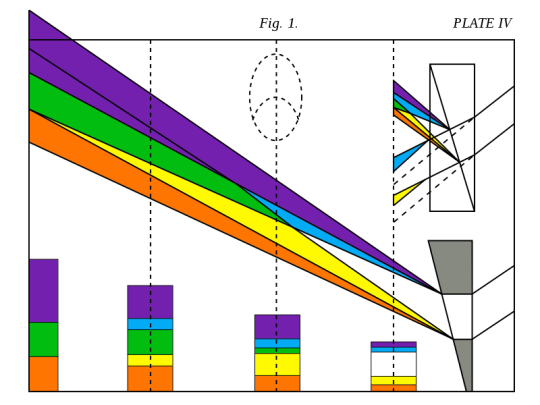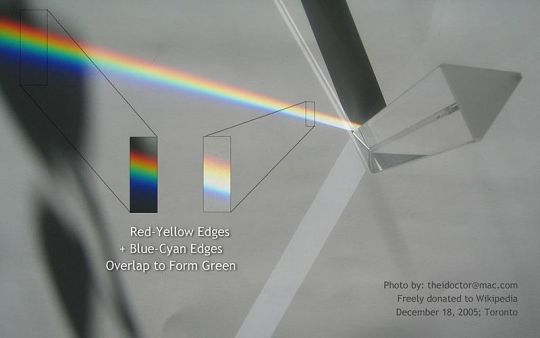#that are perhaps of philosophical value but do not exactly qualify as scientific theory
Explore tagged Tumblr posts
Text

Light spectrum, from Theory of Colours – Goethe observed that colour arises at the edges, and the spectrum occurs where these coloured edges overlap.

Goethe's Theory of Colors
#well this is fascinating af#and also funny i mean this poet is out here hardcore bragging about challenging newton with what were ultimately cool ideas#that are perhaps of philosophical value but do not exactly qualify as scientific theory#when instead he could've explored the same concepts (and they would've been arguably better served) with his art#i mean i'd love to read a prose piece that compares darkness & light to the north & south poles#but presented as a groundbreaking scientific theory it feels silly#classic case of overconfidence. tragic waste of an opportunity to take some badass exploratory risks in poetics.#instead of trying to play another man's instrument he should've focused on experimenting with his own.#'my point is brendan if you're not immediately good at something then why do it' etc#also alternate histories are a whole genre so why don't people write alternate sciences? (i bet they have) why does no one discuss this?#don't worry i will absolutely be investigating further. we're gonna get all the way to the bottom of this one.
0 notes
Text
Minimalism and Solipsism

So back onto the topic of solipsism, what is the relation between Minimalism and Solipsism? According to the wiki document, it states, quote:
"Solipsism is a form of logical minimalism. Many people are intuitively unconvinced of the nonexistence of the external world from the basic arguments of solipsism, but a solid proof of its existence is not available at present. The central assertion of solipsism rests on the nonexistence of such a proof, and strong solipsism (as opposed to weak solipsism) asserts that no such proof can be made. In this sense, solipsism is logically related to agnosticism in religion: the distinction between believing you do not know, and believing you could not have known. However, minimality (or parsimony) is not the only logical virtue. A common misapprehension of Occam's Razor has it that the simpler theory is always the best. In fact, the principle is that the simpler of two theories of equal explanatory power is to be preferred. In other words: additional "entities" can pay their way with enhanced explanatory power. So the realist can claim that, while his world view is more complex, it is more satisfying as an explanation.", unquote.
Ah, this entry is mostly a pile of junk, but let's look into it anyway, and i'll elucidate as to why... So, I would begin by pointing out that: the wiki document is starting with a false premise: that is, solipsism is a form of 'logical' minimalism. Logic is generally held to be the systematic study of the form of valid inference. A valid inference is one where there is a specific relation of logical support between the assumptions of the inference and its conclusion. I would argue that solipsism isn't a study, and that solipsism doesn't need to employ assumptions. One only needs to assume something when one isn't certain about it. Can there be any doubt concerning awareness? Does one need to assume that which gives their entire existence context? Logic is not necessary to flesh this out. There isn't a need to over complicate matters by imposing a bunch of abstractions onto something that is pure and simple.
Solipsism is the process of intimacy with pure lucid awareness, not a conceptual system. It's what is found to be true when the mind settles down, and quiets the yammering narrator that is usually constantly prattling on inside the head. The truth of awareness becomes clear once the distractions have been removed. As such, lucidity isn't a truth that is supported by abstractions or objects, hence, lucidity isn't an inference; in other words, not an ideological conclusion reached on the basis of reasoning or evidence. Evidence in this case, is usually designated to mean an extrinsic aspect... but the evidence of awareness is inherent, and doesn't become validated by being attributed to an outside inventory item. Logic aside, there could be said to be a relation between minimalism and solipsism; as solipsism is the process of becoming acquainted with the truth, facilitated through the application of nihilism; i.e. disassociation with the false. So solipsism might be said to be minimalistic; as, to awaken the clarity of awareness involves the removal of all unnecessary extraneous falsehoods from the mind. Yet, the irony in all this, is that, what is left at the end of this removal process, isn't minimal in itself, as awareness is EVERYTHING. But from the perspective of delusion, yes: the removal of falsehoods may indeed seem to be an exercise of minimalism. But it isn't. There's nothing minimal about shedding an old skin. There's nothing minimal about opening yourself up to the eternal and the infinite within.
Then the article goes on to say that people are intuitively unconvinced of the nonexistence of the external world from the basic arguments of solipsism, even though the solid proof of the world's existence is not currently available. Now is this not the epitome of superstitious religious thinking? They are INTUITIVELY unconvinced, you dig that? Meaning, it's a deeply ingrained belief. Consciousness has been conditioned to accept something that isn't true at face value, despite a lack of proof, and remains unconvinced by any solid indications of otherwise. Yet, I wouldn't say that the central assertion of solipsism rests on the nonexistence of such proof. The lack of proof IS supportive, but is by no means the central contention. This was obviously posited by someone with little to no dealings in lucidity... which is also why they go on to propose a logical comparative association between solipsism and agnosticism. It really just doesn't equate. Solipsism isn't asserting that it believes it does not know, nor that it believes that it could never know. To "know" or "not know" something is an intellectual exercise related to knowledge, and solipsism has nothing to do with knowledge. To become lucid is the only evidence, and such clarity reveals the wholeness of reality, of which there is no inside or outside. The whole of reality is one and the same.
And while we're at it, we might as well take this opportunity to call bullshit on the whole 'weak solipsism / strong solipsism' postulation. I'll probably go into in more depth on this in a future video, but in short: it's said that weak solipsism is when a person believes that the universe is real and physical, meaning independent of the mind, but that their the only human with a consciousness... while strong solipsism is when a person believes that reality is wholly a product of the mind, and that this one mind encompasses the entirety of the universe. I would say that weak solipsism, and aptly titled as such, is the primary reason why solipsism gets a bad rap, as it is a stupid conclusion. If you are going to allow that the appearances in the field of sensory perception are independent of the mind and are physical constructs, why would you conclude your own ego's consciousness to be the only consciousness? It doesn't follow. Hence, the philosophical zombie crops up. This weak solipsism sounds like solipsism when it is approached purely intellectually, and has very little to do with the truth of lucid awareness. If you are approaching solipsism correctly, then there is no need to "believe" anything; as belief is only required when one doesn't know for sure and has to take a leap of faith... and this is the antithesis to the most fundamental principles of solipsism. One either knows, or doesn't know. Belief has no place in the equation. Hence, weak solipsism can be dispensed with as erroneous.
Lastly, the article mentions Occam's Razor, and seems to want to raise the effectiveness of the principle into question, or perhaps maybe only as it pertains to solipsism... why this is true, other then the author just deciding to declare it so, is a mystery to me. He actually suggests that the implications of the principle are misunderstood, asserting that sometimes the simpler theory isn't always the best... and that perhaps with some song n dance, or a little smoke and mirrors, the more complex theory with the most assumptions might actually turn out to be the best theory after all! How exactly would the integrity of the philosophical principle be upheld if it was only right half the time, is beyond me. But I still don't see anything that was proposed herein that made a convincing case for otherwise. It actually just sounds like more externalist apologetics, if you ask me... additional "entities" can pay their way with enhanced explanatory power? What the hell does that even mean? What entities? How much are they paying? And why suddenly are they allowed to do so? Just because a wiki author decided to take it upon himself to amend the principle? Great. I'm sure he's an upstanding keyboard geek who's more then qualified to update the work of William of Ockham. I mean, it's possible that he might have a 2 year graduation certificate from IT Tech, right? Who better to edit a scholastic philosopher! But really... why would a bunch of complex mush suddenly become more convincing? Because some powerful deity bribes us? Or is this just an excuse for the decision to become comfortable in delusion? There's an exception to the rule so, quote:
"the realist can claim that, while his world view is more complex, it is more satisfying as an explanation."???
That's not a philosophical argument. That's not a scientific hypothesis. That's not even everyday common sense. It's an egoic justification for greed and laziness.
"It's more satisfying as an explanation."
Yup. That's about all there is to it.

0 notes